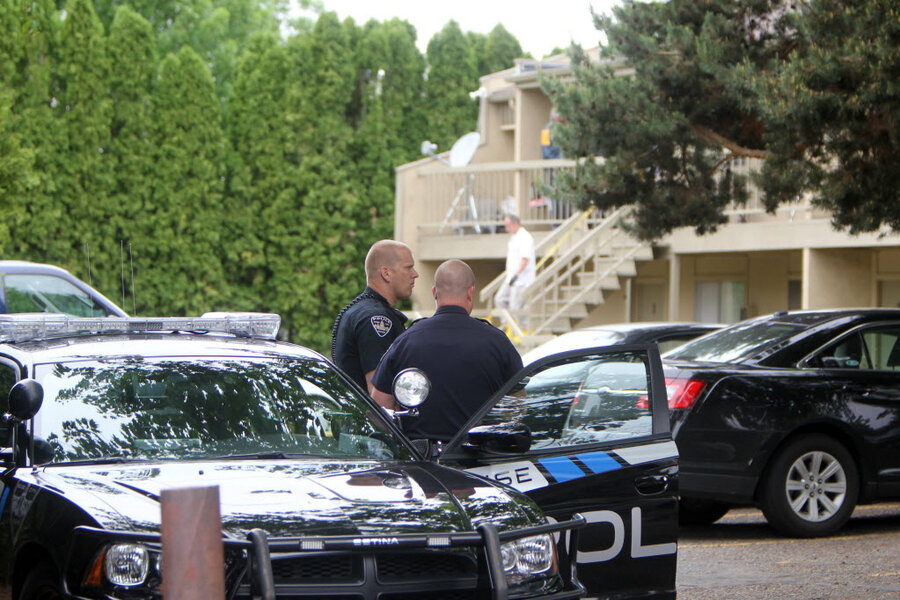Uzbekistan national arrested on terrorism charges in Idaho
Loading...
| Boise, Idaho
Federal authorities in Idaho said Thursday they have arrested an Uzbekistan national accused of conspiring with a designated terrorist organization in his home country and helping scheme to use a weapon of mass destruction.
The US attorney's office said Fazliddin Kurbanov, 30, was arrested at an apartment complex in south Boise on Thursday morning after a grand jury issued a three-count indictment as part of an investigation into his activities in Idaho and Utah.
The Idaho grand jury's indictment charges Kurbanov with one count of conspiracy to provide material support to a foreign terrorist organization, and one count of conspiracy to provide material support to terrorists. The indictment also alleges he possessed an unregistered explosive device.
A separate federal grand jury in Utah also returned an indictment charging Kurbanov with distributing information about explosives, bombs and weapons of mass destruction.
Kurbanov was being held in the Ada County Jail and is scheduled to appear in federal court in Boise at 9 a.m. Friday.
Wendy Olson, the US attorney in Idaho, said Kurbanov is the only person charged, and any potential threat was contained by his arrest.
"He was closely monitored during the course of the investigation," she said. "The investigation has been under way for some time."
Olson declined to share any other specifics of Kurbanov's alleged activities, including whether any potential terrorist threat or targets were domestic or abroad.
A news release from the US attorney's office said Kurbanov is in the United States legally, but Olson declined to give details about his immigration status.
It was unclear when he moved to Idaho or the extent of his activities in Utah. An Idaho telephone number registered to Kurbanov has been disconnected.
The Idaho indictment alleges that between August 2012 and May 2013, Kurbanov knowingly conspired with others to provide support and resources, including computer software and money, to the Islamic Movement of Uzbekistan, a designated terrorist organization. The group's purpose is to overthrow the government of Uzbekistan, said David B. Barlow, US attorney in Utah.
The alleged co-conspirators were not named.
In count two, the indictment alleges Kurbanov provided material support to terrorists, knowing that the help was to be used in preparation for a plot involving the use of a weapon of mass destruction.
The indictment also alleges that on Nov. 15, 2012, Kurbanov possessed an explosive device, consisting of a series of parts intended to be converted into a bomb. Those parts included a hollow hand grenade, a hobby fuse, aluminum powder, potassium nitrate and sulfur.
Meanwhile, in Utah, federal investigators said that for a 10-day period in January 2013, Kurbanov taught and demonstrated how to make an "explosive, destructive device, and weapon of mass destruction."
The grand jury alleges that Kurbanov provided written recipes for how to make improvised explosive devices and went on instructional shopping trips in Utah showing what items are necessary to buy to make the devices, Barlow said. Kurbanov also showed Internet videos on the topic, Barlow said.
The prosecutor declined to say whom Kurbanov took on the shopping trips in Utah but said that information will come out as the case moves through the courts.
The indictment from Utah also alleges that Kurbanov intended that the videos, recipes, instructions and shopping trips be used to make an explosive device for the "bombings of a place of public use, public transportation system, and infrastructure facility."
The arrest, Barlow said, shows that "there is no priority that is more important than the protection of the public and the prevention and disruption of alleged terrorist activities — wherever they might occur."
According to Idaho's court system, Kurbanov was ticketed for speeding violations twice in 2012, once in October, when he paid a $90 fine, and another instance in May when he paid $85.
Associated Press writers John Miller in Boise and Brady McCombs in Salt Lake City contributed to this report.







